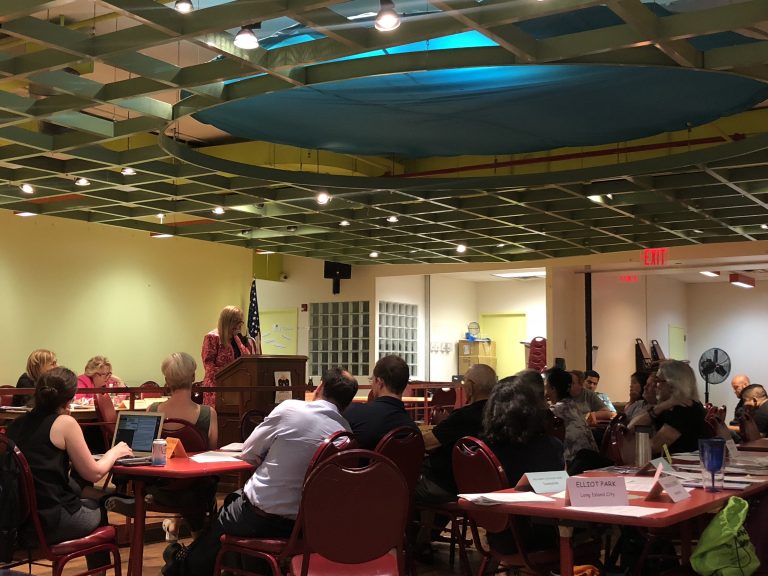
Community Board 2 meeting on Sept. 6, 2018 (Photo: Nathaly Pesantez)
Nov. 6, 2018 By Christian Murray
Voters in New York City have decided to place term limits on community board members.
The vote, at just over 71 percent to roughly 28 percent as of press time, with 78 percent of scanners reporting, will limit community board members to a maximum of four consecutive two-year terms. The provision will go into effect in April 2019, and terms served prior to that date will not count toward the term limit.
Board members who serve the new eight-year term maximum, however, can still re-apply to be on a board after two years out of the position.
Community board members currently serve two-year terms, and are re-appointed without limit.
The proposal was one of three measures pertaining to the city charter that was up for a vote as part of the Nov. 6 elections. One measure called for lowering campaign contributions for candidates in city races while boosting the amount they can receive in matching public funds. That measure passed with roughly 80 percent of the vote as of press time, with 78 percent of precincts reporting. No votes in this category came in at 20 percent.
The other measure asked voters to create a “Civic Engagement Commission” in an aim to increase participation in the democratic process through many levels. The measure, which received 65 percent of the vote as of press time, also requires the commission to provide resources to community boards, including access to professionals and language resources.
The community board term limits proposal, additionally, requires that borough presidents seek out persons of diverse backgrounds for appointment.
While discourse on the ballot proposals played out at length in the weeks leading up to election day, the community board term limits measure saw the most buzz, with high profile officials arguing for and against it.
Mayor Bill de Blasio, for instance, supports the proposal, along with Brooklyn Borough President Eric Adams and local elected leaders such as Council Members Jimmy Van Bramer and Daniel Dromm.
Supporters say the measure would ensure turnover, new members with fresh ideas, and make for boards that are more representatives of their communities, ultimately bolstering democracy.
“It’s important that a diverse group of people get their voices heard and reflect the changing demographics,” Van Bramer said last month. “We miss out when these people who have different ideas and views are shut out because people stay on the board for decades.”
Advocates for term limits also argue that board members are not actually limited, and can be reappointed after stepping aside for one full term.
Detractors, however, argued that the measure would weaken boards, believing that members with institutional knowledge—particularly pertaining to land use and development—would be forced out, while powerful forces like real estate developers would stand the most to gain.
Those against the measure included both the Queens and Manhattan borough presidents, along with City Comptroller Scott Stringer.
“I thought the vote was going to be close,” Van Bramer said. “The New York Times and Daily News came out against it, and so too did Gale Brewer.”
“Despite what some say,” he added, “I think it will strengthen boards since it will ensure that boards change as neighborhoods change.”
